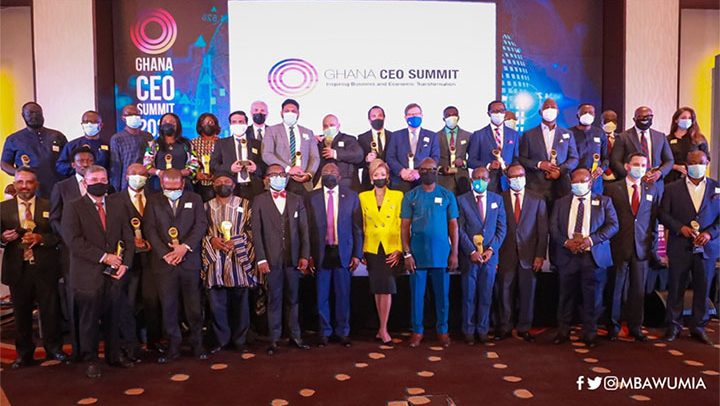Some of the CEOs with the Vice President
Vice President Dr. Mahamudu Bawumia says the government shares in the frustration of Ghanaians, as he explains the prevailing economic conditions in the country.
Speaking at the fifth edition of the Ghana CEO Summit in Accra yesterday, Dr. Bawumia said the current situation is attributable to the negative effects of the coronavirus (COVID-19) pandemic.
“In 2020, the COVID-19 pandemic ravaged the world and severely affected all aspects of our lives. The pandemic undoubtedly affected businesses and economies globally, leading to immeasurable losses in various sectors,” he stated.
He indicated that the COVID-19 had virtually eroded the significant gains made by the Akufo-Addo government in the first term, intimating that the “key drivers of economic growth suffered.”
“Business slowed down and disruptions in global supply chains and trade threatened financial markets and the financial system as a whole. The reverse multiplier effects and the imperatives to save lives put public finances at risk,” he noted.

The Vice President said many governments prioritised saving lives over the economy, and stated that the government was not only confronted with the challenge of social disruptions, but also the challenge of saving the economy so that “we can continue to provide needed savings to households and businesses.”
According to him, a large number of businesses were forced to completely shut down, while others significantly reduced their capacities, asserting that this affected Ghanaian businesses in diverse ways thereby creating high levels of uncertainty and a “plunge in business confidence.”
Dr. Bawumia stated that “the world in the year 2021 continues to live in uncertain times and moving in uncertain directions” since “COVID-19 continues to put public health at risk.”
Even though the country has made a combination of social and economic interventions and policy choices on many fronts, Dr. Bawumia noted that “what Ghana has done and continues to do square well with the way advanced economies are carrying out the fight against the pandemic, and in some cases even better.”

“We continue to deploy an array of social-economic interventions, temporarily lowering the bar on fiscal prudence, and continuing to revise policy choices and interventions as needed,” he emphasised.
The Central Bank, he said, is doing its part lowering interest rates, easing liquidity, mindful not to ignite inflation more than the economy can handle and people can expect.
With the expectations that the pandemic will wane soon, the Vice President noted that “the Ghana Cares Programme laid out a set of policy pathways and instruments to stabilise the economy and stimulate recovery in the shortest possible time.”
For him, “what is left is how the private sector would respond to the policy innovations and interventions which government has put together.”
He, however, gave the Akufo-Addo-led government’s assurance that “we will continue with our comprehensive efforts to save lives, safeguard the educational system, minimise interruptions in the educational system, ensure that micro, small, medium and large enterprises continue to thrive and continue to fuel the economy, even as the pandemic persists.”
“It is in the middle of all these challenges that we must continue to re-examine our ways and means of doing things from home to office, from farm to factory, between government and citizens and businesses and vice versa. We must continue to challenge ourselves on how to deliver learning services, our conventional notion of the classroom, and how to deliver and manage our health system,” he insisted.
“It is absolutely imperative to reset and reignite business and the economy in these times, to ensure continuous growth and development of the Ghanaian economy,” he said, since according to him, “the pandemic has presented a much-needed opportunity with which we can reset the economy, while still building upon the solid foundation already laid.”
Government under the leadership of President Akufo-Addo, he said, continues to take steps to sanitise the regulatory environment for the conduct of business in Ghana and that “digitisation is in progress to have a cashless economy” whilst “providing a framework for electronic incorporation regulation of business entities under the new Companies Act e-Procurement.”
All these, according him, are aimed at making it easier to conduct business in Ghana.
He invited the business community to continue to engage government on the measures they will want the state to put in place to make it easier for them to do business.
By Charles Takyi-Boadu


